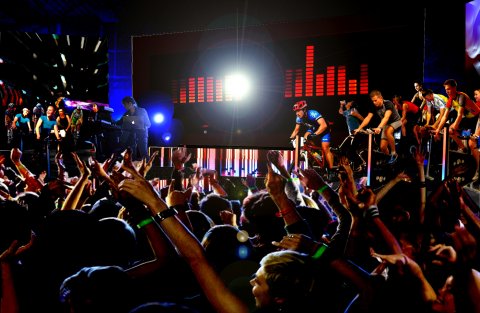Low
energy technology is the future in the action against climate changes, says the
co-founder of the world's first ‘truly’ carbon neutral festival. But is has to be
trendy and free of finger wagging, she adds.
Even though musicians usually express great concern about
the global climate changes and advocate eco-friendly lifestyles, the music
business is somewhat of an energy consumer itself.
A first of its kind
However, in September the world saw yet another step in the
global fight against climate changes.
From the 4th to the 6th of September
Co2penhagen, the world’s first carbon neutral music and art festival ever took
place at DTU, the Technical University of Denmark.
The festival kept carbon neutral by using renewably energy
sources only, which don’t emit any carbon dioxide into the atmosphere, and all
the energy was produced locally on the festival.
“There are other music festivals who call themselves ‘carbon
neutral’, but they are buying quotes to keep it carbon neutral, which isn’t a
sustainable solution. We don’t do that because we want to change people’s
behaviour instead,” says journalist and cofounder Katrine Vejby.
An aha-experience
Katrine Vejby and the other cofounder, architect Nina Louise
Jensen, got inspired to establish the festival a couple of years ago when they
attended a concert in London run solely on solar energy.
Later, Katrine Vejby visited DTU for research purposes and
discovered many new technologies she didn’t know existed, and got somewhat of
an aha-experience.
“I thought, ‘Wow, this is amazing!’
A magnificent world!
It was truly a magnificent world of new climate
technologies,” says Katrine Vejby.
These new technologies, which include an engine which runs
on used tableware and energy-producing bicycles run by the visitors, are
powering an entire festival.
Trendy technology
The Co2penhagen festival is more than just a music and art
festival, and is combining both engineering and design.
"There is a great collaboration between designers and
engineers on Co2penhagen. Solar cells and other sorts of climate technologies
need to be pretty, exquisite and hyped for people to take it to heart. Just
like designer clothing, says Katrine Vejby.
Low energy technology
in everyday life
“We need this to implement low energy technologies in people’s
homes and daily lives.”
But Katrine Vejby does not believe in forcing people to use
eco-friendly technologies.
“It is extremely important that we introduce these new
technologies to the new generation, but instead of saying ‘remember to turn off
the light’ to people, we want to introduce LED light and other kinds of
technology which is sustainable. We want to communicate climate technology in a
new way without finger wagging, mud slinging, or scolding politicians, says
Katrine Vejby.
“We are throwing a huge party and show what is actually
possible and what the future can look like. Typically, engineering and
technology can be a bit boring, but we don’t want it to be too nerdy. It should
be nice, accessible, and cool to introduce low-energy technologies.”
Even though Co2penhagen is a Danish concept, people outside
the borders of Denmark
are aware of the festival.
"We get a lot of international attention. Harvard University has called twice and want to
set up a meeting,” says Katrine Vejby.
Who knows, maybe Co2penhagen will return next year at the Harvard University campus.
CO2PENHAGEN FACT BOX:
* Took place from September 4th to 6th.
* The festival is placed on the campus of DTU and is limited
to 3,000 guests a day.
* The festival uses half as much energy as a regular
festival of the same size.
* The energy comes from a Stirling-motor, a Viking-gasify
system, two generators that run on second generation bio-ethanol and DME (the
gasdimethyl ether), plus solar cells and bicycles.
* The festival consists of five different zones, e.g. an
Activity Zone, with the biking team, which keeps the DJ-stage running.
* The music programme featured Danish artists Dúné, Lulu
Rouge, Camille Jones, Grand Avenue,
and a special Mercury Rev two-day performance in collaboration with the Danish
Film Institute.
(Source: www.co2penhagen.com)
Lasse Berg Sørensen is
currently enrolled at the Erasmus Mundus
Journalism programme at the Danish School of Journalism, University of
Aarhus, University of Amsterdam and City University, London. He graduated from
the Danish School of Journalism in Spring 2009
where he got his bachelors degree in Journalism. The study included a five
months exchange programme at the University of Columbia-Missouri and 18 months
of internship at a local newspaper, TV station and a national radio news
station. Lasse Berg Sørensen currently lives in Aarhus, where he grew up.
